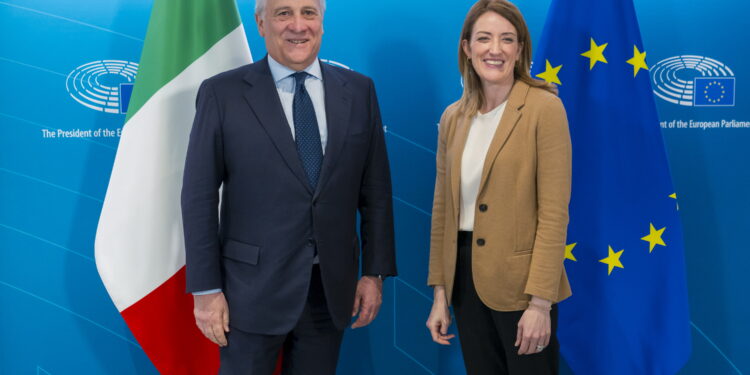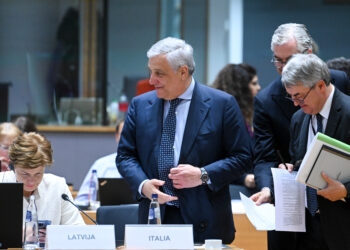Brussels – “There will be no harm for Italy” from the abstention of the premier, Giorgia Meloni, on the name of Ursula von der Leyen to the European Council in late June, much less from the contrary vote of the Fratelli d’Italia group in Strasbourg at the reconfirmation of community executive chair in mid-July. This is the conviction of Antonio Tajani, the Forza Italia deputy prime minister, who met in Brussels with von der Leyen and EU Parliament President Roberta Metsola on the sidelines of the informal Foreign Affairs Council.
The Italian leader told the press outside the European Parliament that with the president of the Parliament, also an expression of the European People’s Party (EPP), “we talked about the hearings” which the commissioner candidates will undergo in the fall. “We are working to ensure stability” in the new von der Leyen Commission, he added, reiterating the position expressed back in the morning that European Affairs Minister (with responsibility for the NRRP, Cohesion and the South) Raffaele Fitto is “the right person” for the post and wishing “that we can achieve the goal of an executive vice-president.”
For that matter, he continued, it would be “foolish” on the part of Italian oppositions “not to work to support the Italian candidate,” arguing that this is a battle of the country and “not of this or that party” or the executive. Recalling Berlusconi’s commitment in 2019 to support Dem Paolo Gentiloni’s candidacy, he said he expected “opposition parties to do the same” on this occasion to “overcome Italian party divisions.”
As for the fact that both Meloni and Melonian (and Leghist) MEPs did not support von der Leyen’s second term, for Tajani, the problem does not arise since the party he has led since Silvio Berlusconi’s demise would act as guarantor of the ruling coalition in Rome: Forza Italia “has always supported von der Leyen: it not only voted for her but was strongly committed to her election.”
The deputy prime minister had met late in the morning precisely with the in pectore president of the EU executive to discuss the main issues on the international agenda and, of course, the composition of the next Commission. Regarding the latter’s male imbalance, Tajani said he was pleased with the “important signal” given by having two women at the head of the EU Parliament and the Commission.
Finally, the Foreign Minister claimed “the agreement reached under Italian pressure so that the Aspides mission (the EU mission in the Red Sea, NDR) can protect and accompany” the Greek oil tanker Sounion, hit last Aug. 21 by Yemeni Houthi militias, to a safe port avoiding “an ecological disaster.” The destination should be Djibouti, which is to be reached by a tugboat provided by Saudi Arabia. The Aspides mission, in the minister’s words, “has always aimed at defending merchant traffic and guaranteeing freedom of navigation, and today it also guarantees freedom from pollution.”
English version by the Translation Service of Withub






